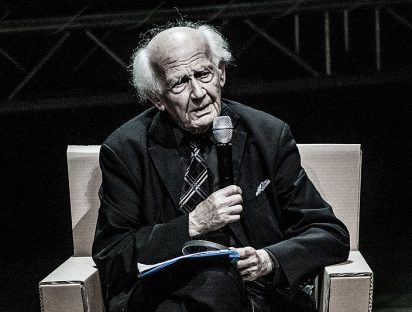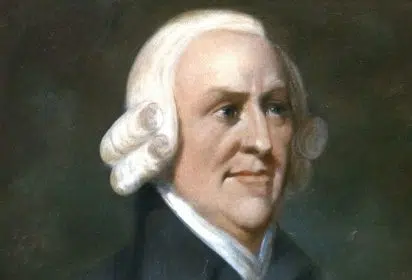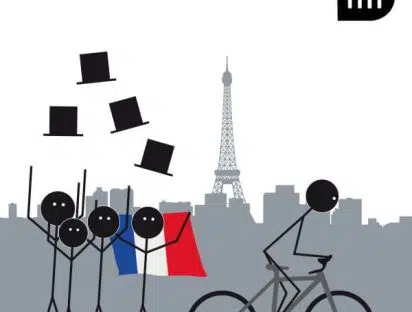
“For the first time, the Swiss judiciary recognizes that the civil disobedience practiced by the climate protesters is justified. Invoked by the lawyers, the ‘lawful state of necessity’ – a legal exception that makes legal an action punishable by law if it is justified by the protection of overriding interests – was retained.” (2)
Reading the five articles that Le Temps newspaper devoted to this case (3), we notice three singular features: the reference to symbols (e.g. the numbers “twelve” and “thirteen” in the “12 activists,” the “12 witnesses” and the “13 bar tenors”), types of characters (“tenor,” “hero,” “master,” “idol”) and personalities, many of whom are not directly involved in the case (in addition to Roger Federer, who is sponsored by Credit Suisse, we also have Greta Thunberg, Jacques Dubochet, 2017 Nobel Prize in Chemistry, one of the 12 witnesses, as well as Martin Luther King and Rosa Parks). These characteristics help to make the story of events a moral tale. It is worth adding another, which justifies the qualification of “tale:” the funny side of the situation, which in this case owes much to the disguises. For when the 12 activists broke into the bank’s premises, they were disguised as tennis players. Their aim was indeed to “challenge Roger Federer, one of its ambassadors” (4).
Justifying one’s own interpellation
As for the “morality” of the tale, it stems as much from the scope of the values at stake as from the consequences of the interpellation we have just mentioned. Roger Federer, who was the object of the questioning, not only responded publicly but, remarkably, also justified the validity of his own questioning:
“[…] I am grateful to young climate activists for pushing us to examine all our behaviors and act on innovative solutions. We owe it to them and ourselves to listen. I appreciate reminders of my responsibility as an individual, athlete and entrepreneur, I’m committed to using this privileged position to dialogue on important issues with my sponsors.” (5)
Roger Federer’s response to his interpellation is typical of this concept. To understand it, let us return to the situation at hand. Roger Federer was challenged by a tweet from 350.org Europe, a tweet shared by Greta Thunberg (6). The activist organisation pointed out Credit Suisse’s commitment to fossil fuels. The tweet ended with the question: “@RogerFederer do you endorse this?” This question takes the form of an interpellation, or hailing. The verb “to interpellate,” which comes from the Latin interpellare: “to interrupt someone, to disturb,” has taken on the meaning of “to cut off someone, to interrupt,” then to “summon someone, to put him on notice to explain himself on the facts” (7).
“Hey, you there!”
The French Marxist philosopher Louis Althusser described interpellation (he uses the French word “interpellation”) well in a text devoted to the way in which ideologies shape human lives (8). He took the ordinary example of the questioning of a person in the street: “Hey, you there!” Here is what he had to say about it:
“Assuming that the theoretical scene I have imagined takes place in the street, the hailed individual will turn round. By this mere one-hundred-and-eighty-degree physical conversion, he becomes a subject. Why? Because he has recognized that the hail was ‘really’ addressed to him, and that ‘it was really him who was hailed’ (and not someone else). Experience shows that the practical telecommunication of hailings is such that they hardly ever miss their man: verbal call or whistle, the one hailed always recognizes that it is really him who is being hailed. And yet it is a strange phenomenon, and one which cannot be explained solely by ‘guilt feelings’, despite the large numbers who ‘have something on their consciences’.”
“And yet [hailing] is a strange phenomenon,” Althusser observes. Acknowledging that one is the target of an anonymous call – “Hey, you there!” – is indeed strange if we consider that, by turning around in the street, or simply by reacting, the person recognises themselves as the subject. It is not just a matter of their understanding that the speaker is talking to them. It is a matter of recognising that they are subjugated – they are “subjugated by their very interpellation,” to use Althusser’s words in the context of his argument about ideological interpellation.
Being summoned to respond
Of course, in this case, the interpellation did not take the anonymous form of “Hey, you there!” Roger Federer did not have to ask himself to whom the question was addressed: “Do you endorse this?” But it was indeed an interpellation, not only because three of the five articles in Le Temps used this term, but also because of the summons to answer contained in the question asked and the content of Roger Federer’s answer. This answer could be interpreted as “contain[ing] many words without making the slightest commitment to changing his relationship with Credit Suisse” – “a non-committal reply” (9). But the idea of interpellation provides another interpretation, which seems to us both more plausible and more worthy of interest. For Roger Federer’s answer did not originate as a question, but as a summons. And this changes the interpretation considerably. Alain Anquetil (1) “Le procès des militants climatiques devient celui des banques,” Le Temps, 7 January 2020. (2) “Les manifestants pour le climat mettent Credit Suisse à terre,” Le Temps, 13 January 2020. (3) In addition to the two articles mentioned above “Jugement sur l’occupation de Credit Suisse : l’urgence climatique repousse les contours de l’état de nécessité, ” 13 January 2020 ; “La justice légitime la désobéissance civile,” 13 January 2020 ; “Procès Credit Suisse : à vaincre sans péril…,” 13 January 2020, by P. Nantermod. (4) “Les manifestants pour le climat mettent Crédit Suisse à terre,” op. cit. (5) See “Federer Responds to Thunberg’s ‘Wake-Up’ Volley,” New York Times, 12 January 2020. https://www.nytimes.com/reuters/2020/01/12/sports/tennis/12reuters-tennis-federer.html (6) “Roger Federer responds to climate crisis criticism from Greta Thunberg,” The Guardian, 12 January 2020. (7) Source (in French): CNRTL. (8) L. Althusser, “Idéologie et appareils idéologiques d’État. (Notes pour une recherche),” 1970, in Positions (1964-1975), Paris, Les Éditions sociales, 1976, translated by Ben Brewster, “Ideology and Ideological State Apparatuses. (Notes towards an Investigation),” in Lenin and Philosophy and Other Essays, Monthly Review Press, 1971. (9) “Roger Federer issues non-committal reply to Greta Thurnberg fossil fuel criticism,” The Telegraph, 11 January 2020. [cite]




